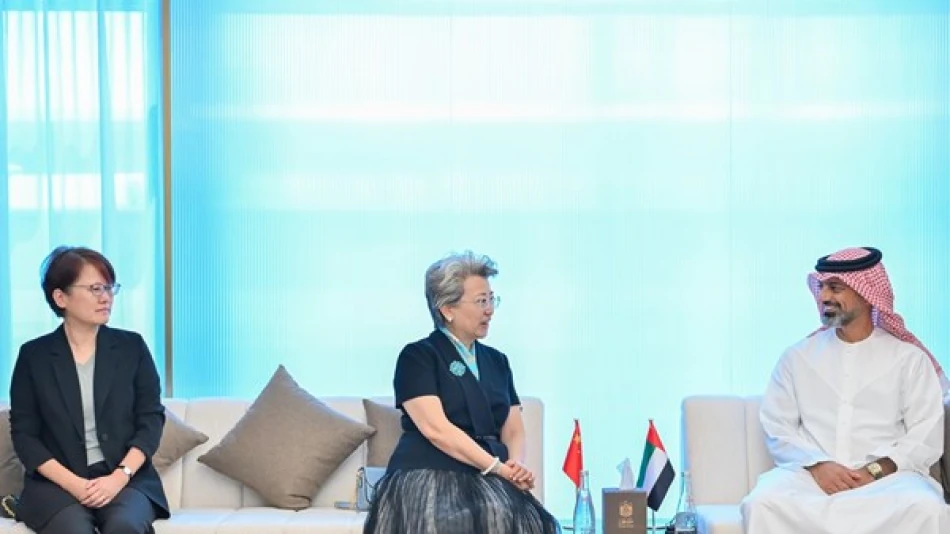
Emirati Leader Emaar Al Nuaimi Explores Avenues for Boosting China Cooperation
Ajman Crown Prince Strengthens UAE-China Economic Ties in High-Level Diplomatic Meeting
The UAE's strategic pivot toward Asia gained momentum as Ajman's Crown Prince Sheikh Ammar bin Humaid Al Nuaimi hosted China's Consul General Ou Boqian in a diplomatic meeting focused on expanding bilateral cooperation in trade and tourism. The encounter underscores the UAE's broader strategy to diversify economic partnerships beyond traditional Western allies, positioning the federation as a key gateway for Chinese investment in the Middle East.
Strategic Diplomatic Engagement
Crown Prince Sheikh Ammar welcomed Consul General Ou Boqian at the Amiri Diwan's government building, marking another milestone in the UAE-China relationship that has flourished over the past decade. The meeting, attended by senior Ajman officials including Sheikh Rashid bin Ammar Al Nuaimi and key administrative leaders, signals the emirate's commitment to attracting Chinese investment and tourism.
The Crown Prince expressed hopes for enhanced cooperation across multiple sectors, with particular emphasis on commercial and tourism opportunities. This diplomatic outreach aligns with the UAE's Vision 2071 strategy, which aims to make the country a global hub connecting East and West.
Economic Implications for Regional Trade
Tourism and Investment Opportunities
Consul General Ou Boqian praised Ajman's rapid development in tourism and economic sectors, highlighting the emirate's potential as an attractive destination for Chinese visitors and investors. This recognition comes as the UAE has become increasingly popular among Chinese tourists, with visitor numbers from China showing consistent growth pre-pandemic.
Ajman's focus on Chinese partnerships reflects a broader trend across the UAE, where emirates are individually courting international investment to diversify their economies beyond oil dependency. The emirate's strategic location and growing infrastructure make it an appealing option for Chinese businesses seeking Middle Eastern market access.
Historical Context and Cultural Foundations
Both officials emphasized the historical and cultural ties between the UAE and China, referencing the ancient Silk Road connections that have been revitalized through China's Belt and Road Initiative. The UAE serves as a crucial logistics hub for Chinese goods entering the Middle East and Africa, with Dubai's Jebel Ali Port handling significant Chinese trade volumes.
This relationship has deepened significantly since 2018, when the UAE became the first Arab country to establish a comprehensive strategic partnership with China. Bilateral trade between the nations exceeded $70 billion in recent years, making China one of the UAE's largest trading partners.
Regional Competitive Dynamics
Ajman's diplomatic engagement with China mirrors similar initiatives across the Gulf region, where countries like Saudi Arabia and Qatar are also strengthening ties with Beijing. However, the UAE's federal structure allows individual emirates to pursue targeted partnerships, giving Ajman flexibility to attract specific Chinese investments in sectors like real estate, manufacturing, and logistics.
The meeting also reflects China's growing diplomatic presence in the Gulf, as Beijing seeks to secure energy supplies and expand its geopolitical influence in a region traditionally dominated by Western powers. For investors, this trend suggests continued opportunities in UAE-China joint ventures and cross-border investments.
Market Outlook and Investment Implications
The strengthening UAE-China relationship presents significant opportunities for businesses and investors operating in both markets. Ajman's relatively lower real estate costs compared to Dubai and Abu Dhabi, combined with its improving infrastructure, could attract Chinese manufacturers and logistics companies seeking regional bases.
This diplomatic momentum also supports the UAE's ambition to become a leading destination for Chinese financial services and technology companies expanding into the Middle East. The meeting signals that smaller emirates like Ajman are actively positioning themselves to capture spillover benefits from the broader UAE-China partnership, potentially creating new investment corridors and business opportunities in the coming years.
Most Viewed News

 Layla Al Mansoori
Layla Al Mansoori






